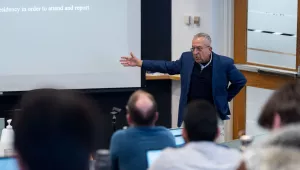While the U.S. media spends countless hours discussing the vagaries of American non-involvement in Syria, little is being said about the conflict's ramifications for the stability, borders and realpolitik of the Middle East – or the changing role of outside nations in the region's affairs. Yet there are massive, historic and intensely important implications that we need to understand. Indeed, the Syrian civil war is but a catalyst for numerous shifts taking place in the regional and global power structure.
First and foremost, the Syrian tragedy is a turning point in the long established tradition of Western intervention in the Middle East and the wider Muslim world. The quagmire has brought to the fore the new reality that the United States and its European allies no longer have the political and economic stomach to openly engage their militaries in another regional conflict. While the so-called Arab Spring brought with it huge expectations to the Arab world of freedom and democracy, the dawning era of Western military disengagement from the region is going to have even more widespread implications as shifting borders and military alliances usher in a transition phase.
Absent outside intervention, the Syrian conflict has the potential to continue for many years. Given the support that the al-Assad regime is receiving from Russia and Iran, and arms being delivered to the rebels from the Saudi-led Gulf Cooperation Council (GCC) states, the United States and France, one is reminded that the Lebanese civil war lasted for 15 years.
But the current conflict is not limited to Syria – it is already spilling outward to its neighbors, while pulling other nations and tribes increasingly into its deadly vice. In Turkey, Erdogan may face relatively limited political opposition (as seen by the recent demonstrations in Taksim Square), but he is confronting a sectarian opposition centered on the minority Alevi community's open support for al-Assad’s beleaguered Alawi-dominated regime in Hatay, the Turkish province bordering Syria. The more the Alevi get involved, the more Turkey is dragged in.
With direct foreign military intervention by major Western nations ending in the region, the Iranians are coming to believe that their policies are paying off, and they will increase their participation in the Syrian conflict. Their expanded involvement will have ripple effects throughout the smaller states surrounding Syria, all of which are already tenuously balanced between internal and external power blocs. In fact, tribal, sectarian, and ideological tensions are already flaring in a number of states.
Lebanon, meanwhile, is already on the verge of being sucked into the Syrian swirl with clashes between Sunnis and Alawis in Tripoli, Sunnis and Shias in Beirut, and Sunnis and non-Shia Hezbollah supporters in Saida. In addition, the demographic change that is occurring in Lebanon with the influx of Syrian Sunni refugees will alter the historically delicate sectarian balance between the Sunnis, Shias, Christians and Druze communities.
In Iraq, the growing ties between Syrian, Turkish and Iraqi Kurds will shift sovereign boundaries; the Iraqi Shias are taking sides with the al-Assad regime, terrified that its fall will bring about a near complete Sunni encirclement of Iraq’s Shia territories; and the inherent hatred between the Sunnis and Shias is causing the Sunnis to find common cause with the Syrian rebels.
And in Jordan, the Hashemite Kingdom is experiencing one of the largest refugee influxes (more than 500,000 Syrians have crossed over) since its founding, putting huge pressure on an already weak economy and poor public infrastructure. By effectively adding a third demographic group to the nation's Palestinians and tribal Jordanians, the influx will drastically alter the nation's demographics and power balance.
So, what can be done? In short, the burden of managing the political, economic and financial chaos of the regional consequences falls on the Saudi-led GCC. The removal of al-Assad is simply too important an opportunity to check Iranian interference in the Arab world for the Saudis and their allies to leave it to a deceitful Russian plan.
Fortunately, there is precedent for proactive Saudi and GCC engagement bringing about positive change, stability and even the resolution of conflict in Middle Eastern states. In Egypt, when it became clear that the Muslim Brotherhood could not rule the country because of its failure to manage the economy, a large portion of the Egyptian people revolted and pressured the army to intervene and dislodge President Morsi and his Brotherhood supporters from power. With the West failing to become directly involved, Saudi Arabia led the region in legitimizing this takeover, and orchestrated a $12 billion bailout package to aid the new Egyptian leaders.
And in Bahrain, when it became clear that the United States and its European allies were wavering in directly supporting the Bahraini monarchy as it faced a massive uprising among its majority Shia population, a Saudi-backed GCC force was sent in to assist Bahraini security personnel in securing critical infrastructure. The GCC knew full well the overthrow of the Bahraini monarchy would pose a vital threat to their security by handing a strategic victory to Iran and their proxy Shia groups. Bahrain was a clear red line!
Ultimately, the Syrian conflict is not only a major humanitarian crisis, but a hub in a transforming Middle East. As it becomes clear the region must handle its own affairs to a degree never before seen, major states such as Saudi Arabia will have to do everything in their power to support and stabilize the region.
With the possibility of widespread sectarian strife emerging from the Syrian conflict, it is absolutely vital that the Saudis and the GCC, as they did in Egypt and Bahrain, quickly move to ensure that the al-Assad regime finally falls. They must do it for themselves, for regional security in containing Iran, to prevent al Qaeda in the Levant from rising and, above all else, for the Syrian people.
Khashoggi, Jamal. “Syria Tragedy A Turning Point for West.” CNN, September 16, 2013



